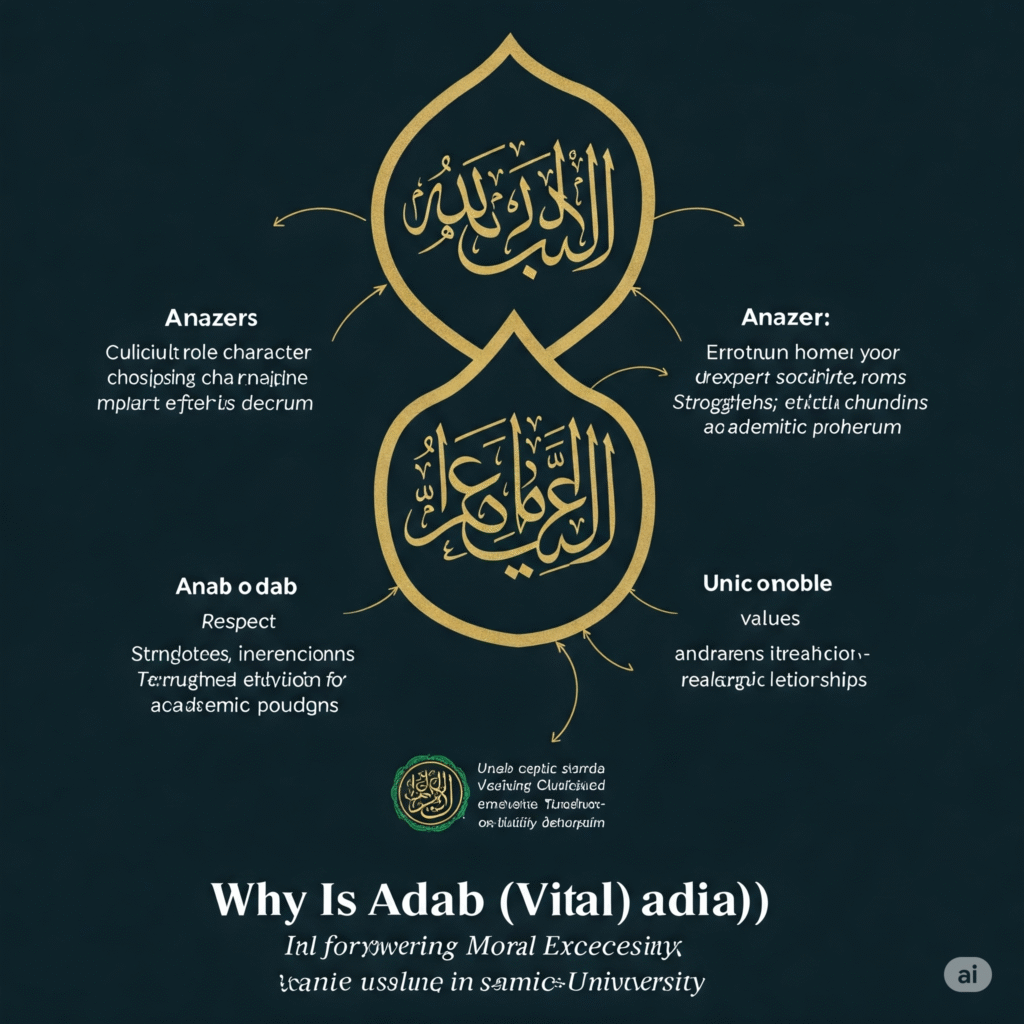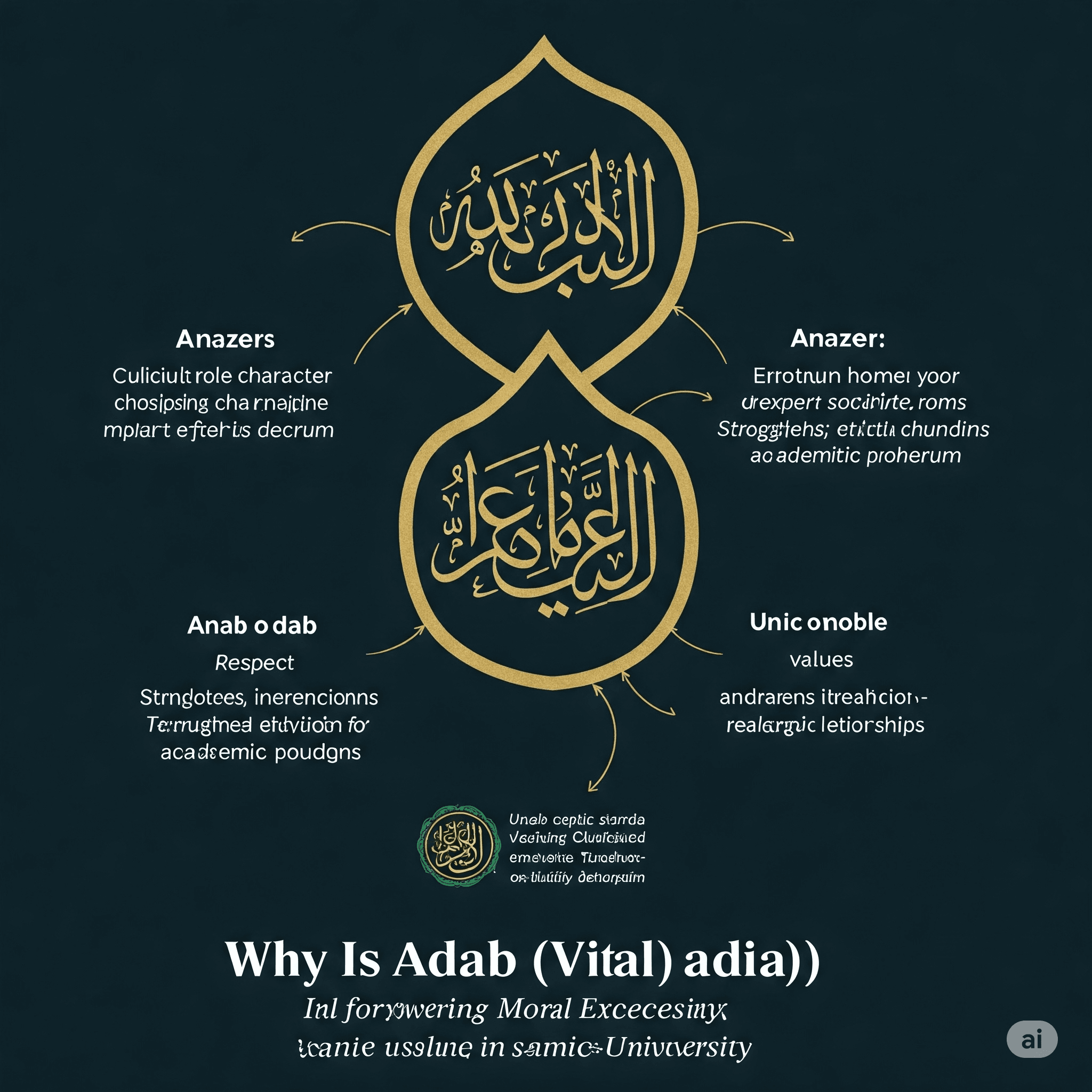In the Islamic tradition, Adab—encompassing manners, etiquette, moral refinement, and spiritual decorum—is a foundational pillar of personal and communal life. Far more than superficial politeness, Adab reflects a holistic approach to ethical conduct, rooted in devotion to Allah, respect for others, and self-discipline. The Qur’an and Sunnah elevate Adab as an essential expression of faith, with the Prophet Muhammad (peace be upon him) stating, “I was sent to perfect noble character” (Muwatta Malik, 47.1.8). In Islamic higher education, Adab is not a peripheral virtue but the very soul of the educational mission, shaping curricula, campus culture, faculty-student dynamics, and societal contributions. Drawing on classical Islamic texts such as the Qur’an, Hadith, and works by scholars like Imam Al-Ghazali, Ibn Miskawayh, and Al-Shatibi, this article provides an exhaustive exploration of Adab’s multifaceted role in Islamic universities, highlighting its integration across academic, spiritual, social, and global dimensions.

1. Adab as the Bedrock of Islamic Educational Philosophy
Islamic higher education is distinguished by its commitment to holistic development, integrating intellectual rigor with spiritual depth and moral excellence. The Qur’an emphasizes the sanctity of knowledge and conduct: “And say: My Lord, increase me in knowledge” (Qur’an 20:114), while also urging believers to “speak to people good [words]” (Qur’an 2:83). Adab bridges these imperatives, ensuring that the pursuit of knowledge is accompanied by refined character.
Imam Al-Ghazali, in Ihya Ulum al-Din, describes Adab as “the adornment of the soul,” arguing that knowledge without manners is barren. This perspective informs the mission of institutions like Al-Azhar University in Cairo, the Islamic University of Madinah, and the International Islamic University Malaysia (IIUM), where Adab is a guiding principle. The Hadith, “The best among you are those who have the best manners and character” (Sahih al-Bukhari, 3559), underscores Adab’s centrality, positioning it as a prerequisite for fulfilling the Prophetic ideal of being “a mercy to mankind” (Qur’an 21:107). By embedding Adab in their ethos, Islamic universities cultivate graduates who are not only scholars but also exemplars of ethical conduct.
Historically, Islamic educational institutions, such as the House of Wisdom in Baghdad and Al-Qarawiyyin in Fez, prioritized Adab as a marker of scholarly excellence. Scholars like Ibn Sina and Al-Farabi emphasized that true erudition requires humility and respect, a tradition that modern Islamic universities uphold. This historical continuity ensures that Adab remains a timeless framework for education, aligning academic pursuits with spiritual and moral objectives.
2. Embedding Adab in the Academic Curriculum
Islamic universities integrate Adab into their curricula through dedicated courses and interdisciplinary approaches, ensuring that students internalize its principles across all fields of study. Core Islamic sciences—such as Tafsir (Qur’anic exegesis), Hadith, Fiqh (jurisprudence), and Akhlaq (moral character)—provide a foundation for understanding Adab. Texts like Ibn Miskawayh’s Tahdhib al-Akhlaq outline virtues such as humility, patience, and sincerity, while Al-Ghazali’s Bidayat al-Hidayah offers practical guidance on courteous behavior, such as listening attentively and speaking kindly.
For instance, at Al-Azhar University, students in engineering, medicine, and humanities study Hadith collections like Sahih Muslim, which emphasize Adab in daily interactions: “None of you truly believes until he loves for his brother what he loves for himself” (Sahih al-Bukhari, 13). These teachings foster empathy and respect in academic discussions, ensuring that intellectual debates are conducted with civility. Similarly, the Islamic University of Madinah incorporates lessons from Al-Shatibi’s Al-Muwafaqat, which links Adab to Maqasid al-Shari’ah (objectives of Islamic law), such as preserving honor and intellect.
In professional disciplines, Adab is applied contextually. Medical students at Qatar’s Hamad Bin Khalifa University learn the etiquette of patient care, drawing on Al-Ghazali’s emphasis on compassion in Ihya Ulum al-Din. Law students at IIUM study the manners of judicial conduct, referencing Ibn Qayyim al-Jawziyya’s I’lam al-Muwaqqi’in, which stresses fairness and humility in adjudication. Business programs incorporate Adab through courses on Islamic finance, emphasizing ethical transactions and the prohibition of deceit, as per the Qur’anic verse: “Woe to those who give less [than due]” (Qur’an 83:1).
By weaving Adab into both Islamic and secular studies, universities ensure that students view manners as integral to expertise, producing professionals who uphold ethical standards in their fields.
3. Cultivating a Campus Culture of Adab
The campus environment of Islamic universities is meticulously designed to foster Adab, creating a community where respect, dignity, and spiritual mindfulness prevail. The Qur’anic injunction to “lower your voice” (Qur’an 31:19) sets the tone for interpersonal interactions, encouraging students to communicate with courtesy and restraint. Institutions like Al-Qarawiyyin University in Morocco and Universitas Islam Indonesia enforce codes of conduct that reflect Islamic values, including modesty in dress, respectful dialogue, and academic integrity.
Student organizations play a pivotal role in reinforcing Adab. At Malaysia’s Universiti Sains Islam Malaysia (USIM), Islamic societies organize workshops on Prophetic manners, highlighting examples like the Prophet’s practice of greeting others with a smile (Sahih Muslim, 2626). These activities cultivate a sense of Ummah (community), aligning with the Hadith: “The example of the believers in their affection, mercy, and compassion for each other is that of a body” (Sahih al-Bukhari, 6011). Interfaith and cultural events, such as those at Turkey’s Marmara University, promote Adab in diverse settings, teaching students to engage with others respectfully, as per the Qur’anic principle: “To you is your religion, and to me is my religion” (Qur’an 109:6).
On-campus mosques and prayer rooms serve as sanctuaries for practicing Adab in worship. Students are taught the etiquette of Salah, such as maintaining silence and cleanliness, based on Al-Ghazali’s teachings in Ihya Ulum al-Din on the manners of mosques. These practices foster mindfulness and reverence, which translate into refined behavior in academic and social contexts. Regular spiritual programs, such as Qur’an recitation circles and Dhikr sessions, further reinforce Adab, encouraging students to approach their studies and relationships with sincerity and humility.
4. Faculty as Role Models of Adab
Faculty members in Islamic universities are not merely educators but moral and spiritual exemplars, embodying the Prophetic qualities of Sidq (truthfulness), Amanah (trustworthiness), and Hilm (forbearance). The Qur’an praises those who guide with wisdom: “Invite to the way of your Lord with wisdom and good instruction” (Qur’an 16:125). Al-Ghazali’s Bidayat al-Hidayah advises teachers to be patient, approachable, and sincere, qualities that faculty at institutions like the University of Sharjah strive to emulate.
Professors incorporate Adab into their pedagogy by fostering respectful classroom environments. For example, at IIUM, a science professor might begin a lecture with a du’a (supplication) for knowledge, setting a tone of humility, as recommended in the Hadith: “Whoever seeks knowledge, Allah will make easy for him a path to Paradise” (Sahih Muslim, 2699). Faculty also mentor students on personal and ethical challenges, offering guidance on issues like time management or interpersonal conflicts, mirroring the Prophetic model of mentorship.
In addressing academic misconduct, faculty employ restorative practices, such as counseling, rather than solely punitive measures, reflecting the Islamic principle of Tarbiyah (nurturing growth) outlined in Ibn Qayyim’s Tuhfat al-Mawdud. By modeling Adab, faculty shape students’ character, ensuring that the pursuit of knowledge is inseparable from moral refinement.
5. Adab in Community Engagement and Social Responsibility
Islamic universities view community engagement as an extension of Adab, emphasizing service as an act of worship conducted with humility and respect. The Qur’an calls believers to enjoin good: “You are the best nation produced for mankind. You enjoin what is right and forbid what is wrong” (Qur’an 3:110). This principle inspires outreach programs that teach students to serve with dignity.
For example, the International Islamic University in Islamabad organizes initiatives like literacy programs, healthcare camps, and environmental cleanups. Students interact with communities courteously, reflecting the Hadith: “The best of people are those who bring the most benefit to others” (Al-Tabarani, Mu’jam al-Kabir). These activities are guided by Ibn Miskawayh’s Tahdhib al-Akhlaq, which emphasizes serving others without arrogance or condescension.
Globally, universities like Istanbul Sabahattin Zaim University partner with NGOs to support refugee education and disaster relief, ensuring that students uphold Adab in cross-cultural contexts. For instance, volunteers are trained to approach vulnerable populations with empathy, aligning with the Qur’anic call to show kindness to the needy (Qur’an 93:10). By embedding manners in service, universities teach students to uphold dignity in all interactions, fulfilling the Islamic ideal of Rahmah (mercy).
6. Adab in Intellectual Discourse and Critical Thinking
Adab is essential in intellectual discourse, ensuring that critical thinking is conducted with respect, humility, and openness. The Qur’an encourages reflection: “Do they not reflect upon the Qur’an, or are there locks upon their hearts?” (Qur’an 47:24). Islamic universities foster Ijtihad (independent reasoning) within ethical boundaries, drawing on the methodologies of scholars like Imam Malik and Al-Shatibi.
At the University of Sharjah, students engage with contemporary issues—such as artificial intelligence, bioethics, and climate change—using texts like Al-Shatibi’s Al-Muwafaqat to apply Maqasid al-Shari’ah (e.g., preserving life and intellect). Professors encourage respectful debates, citing the Prophetic example of listening attentively to others (Sahih al-Bukhari, 950). Ibn Qayyim’s Madarij al-Salikin warns against intellectual arrogance, urging scholars to approach knowledge with humility, a principle reinforced in seminars and workshops.
This culture of respectful discourse equips students to contribute to global conversations ethically, balancing confidence with courtesy. For example, law students at IIUM might debate the ethics of data privacy, referencing the Qur’anic emphasis on guarding trusts (Qur’an 4:58), while maintaining decorum in their arguments. By fostering Adab in intellectual pursuits, universities prepare students to be thoughtful and principled contributors to society.
7. Adab and Tazkiyah: Purifying the Soul
Adab is intrinsically linked to Tazkiyah (purification of the soul), a core objective of Islamic education. The Qur’an states: “He has succeeded who purifies it [the soul]” (Qur’an 91:9). In Islamic universities, Adab serves as a practical manifestation of Tazkiyah, cleansing the heart of vices like pride, envy, and insincerity while cultivating virtues like gratitude, patience, and sincerity.
Spiritual programs, such as I’tikaf retreats during Ramadan at the Islamic University of Gaza, teach students the etiquette of worship, drawing on Al-Muhasibi’s Risalat al-Mustarshidin. Lectures on Adab, based on Al-Ghazali’s Ihya Ulum al-Din, emphasize self-accountability, encouraging students to refine their intentions and behavior. For instance, students are taught to seek knowledge for Allah’s pleasure, not worldly gain, as per the Hadith: “Whoever learns knowledge by which the pleasure of Allah is sought… Allah will admit him into Paradise” (Sunan Ibn Majah, 252).
Universities also organize Dhikr sessions and Qur’an memorization circles, which foster mindfulness and humility, aligning with Ibn Qayyim’s teachings in Madarij al-Salikin on purifying the heart through remembrance. By linking Adab to Tazkiyah, universities ensure that manners are not superficial but rooted in profound spiritual transformation, producing graduates who embody Ihsan (excellence in faith and conduct).
8. Adab in Digital Learning Environments
As Islamic higher education embraces digital platforms, Adab remains a critical framework for online learning environments. The rise of virtual classrooms, particularly through institutions like the International Open University (IOU), necessitates the adaptation of traditional Adab to digital contexts. The Qur’anic principle of speaking kindly (Qur’an 2:83) extends to online interactions, where students are encouraged to communicate respectfully in discussion forums and virtual seminars.
IOU’s online programs include modules on digital etiquette, drawing on Al-Ghazali’s Bidayat al-Hidayah, which advises restraint in speech. Students are taught to avoid inflammatory language, maintain professionalism in emails, and respect intellectual property, reflecting the Hadith: “A kind word is a form of charity” (Sahih al-Bukhari, 6927). Faculty moderate online discussions to ensure courteous exchanges, fostering a virtual Ummah grounded in Adab.
Moreover, digital platforms offer opportunities to teach Adab globally. Webinars on Prophetic manners, hosted by universities like Indonesia’s UIN Sunan Kalijaga, reach diverse audiences, emphasizing universal values like respect and empathy. By integrating Adab into digital education, Islamic universities ensure that technological advancements enhance, rather than undermine, ethical conduct.
9. Adab in Interfaith and Cross-Cultural Engagement
Islamic universities operate in increasingly diverse global contexts, making Adab a vital tool for interfaith and cross-cultural engagement. The Qur’an advocates coexistence: “Allah does not forbid you from those who do not fight you because of religion… to deal with them justly” (Qur’an 60:8). Universities like Al-Qarawiyyin and Jordan’s University of Jordan organize interfaith dialogues and cultural exchanges, teaching students to engage with non-Muslims respectfully.
For example, IIUM’s interfaith seminars draw on the Prophetic example of treating non-Muslims with kindness, as seen in the Prophet’s interactions with his Christian and Jewish neighbors (Sahih al-Bukhari, 1248). Students learn to listen attentively, avoid polemics, and present Islamic perspectives with clarity and courtesy, as advised in Al-Ghazali’s Ihya Ulum al-Din. These initiatives foster mutual understanding, positioning graduates as ambassadors of Islam’s universal values.
Adab also guides cross-cultural collaborations, such as international research projects at Turkey’s Marmara University, where students work with global peers while upholding Islamic etiquette. By emphasizing Adab in diverse settings, universities prepare students to navigate pluralism with grace and integrity.
10. Adab in Leadership Development
Islamic universities prioritize Adab in developing ethical leaders, recognizing that leadership in Islam is a form of service. The Prophet Muhammad (peace be upon him) said, “The leader of a people is their servant” (Sunan Abu Dawud, 2932). This principle informs leadership training programs at institutions like the Islamic University of Madinah, where students learn to lead with humility, justice, and compassion.
Courses on Islamic governance draw on texts like Al-Mawardi’s Al-Ahkam al-Sultaniyya, which emphasizes the etiquette of leadership, such as consulting others and avoiding tyranny. Student councils, such as those at USIM, provide practical opportunities to practice Adab in leadership roles, encouraging members to listen to peers and resolve conflicts with Hilm (forbearance). Workshops on public speaking teach students to communicate with clarity and respect, citing the Qur’anic praise for eloquent yet humble speech (Qur’an 55:1-4).
By cultivating Adab in leadership, universities produce graduates who embody the Prophetic model of servant leadership, capable of guiding communities with integrity in fields like politics, education, and business.
11. Global Impact and Universal Relevance of Adab
In a globalized world, the emphasis on Adab in Islamic higher education has profound universal relevance, equipping students to navigate diverse societies with ethical clarity. The Qur’anic call to be “a mercy to mankind” (Qur’an 21:107) underscores the applicability of Adab across cultures and contexts. Graduates of Islamic universities, trained in manners like fairness, empathy, and respect, contribute to global fields such as diplomacy, healthcare, and technology with a commitment to ethical conduct.
For example, alumni of Al-Azhar working in international organizations uphold Adab in negotiations, reflecting the Hadith: “A kind word is a form of charity” (Sahih al-Bukhari, 6927). In healthcare, graduates of Hamad Bin Khalifa University apply the etiquette of patient care, ensuring dignity for all, as emphasized in Ibn Miskawayh’s Tahdhib al-Akhlaq. Online programs, such as those offered by IOU, extend Adab’s reach, teaching students worldwide to uphold ethical standards in virtual and physical spaces.
Moreover, Adab aligns with universal ethical principles, making it a bridge for interfaith and intercultural collaboration. By promoting Adab, Islamic universities fulfill the Prophetic mission of spreading mercy and justice, contributing to a more harmonious global society.
Conclusion
Adab is the lifeblood of Islamic higher education, infusing every facet of the academic experience with spiritual, moral, and ethical significance. By embedding Adab in curricula, cultivating a campus culture of respect, modeling exemplary conduct through faculty, integrating manners in community service, ensuring respectful intellectual discourse, linking Adab to Tazkiyah, adapting it to digital environments, promoting interfaith engagement, fostering ethical leadership, and emphasizing its global relevance, Islamic universities fulfill their mission of producing individuals who are intellectually accomplished, spiritually grounded, and morally upright. Rooted in the Qur’an, Hadith, and classical works by scholars like Al-Ghazali, Ibn Miskawayh, and Al-Shatibi, Adab transforms education into a sacred endeavor, preparing students to be ambassadors of Islam’s universal values. In an era marked by ethical challenges and cultural diversity, the emphasis on Adab in Islamic higher education offers a timeless model for cultivating character, fostering harmony, and serving humanity with dignity and purpose.
- Conquer the Post-Ramadan Blues: Unleash Vibrant Spirituality to Sustain Momentum After Eid!
- How Do Islamic Institutions of Higher Learning Cultivate Moral and Spiritual Values?
- Exploring the Empowering Reality: Women’s Rights and Roles in Islamic Prayer, Clarifying Misconceptions
FAQs
What is Adab, and why is it important in Islamic higher education?
Adab refers to manners, etiquette, and moral conduct rooted in Islamic teachings. It is vital in Islamic universities to ensure knowledge is pursued with humility and respect, as the Prophet Muhammad (peace be upon him) said, “I was sent to perfect noble character” (Muwatta Malik, 47.1.8).
How do Islamic universities incorporate Adab into their curricula?
They offer courses on Akhlaq and Adab, drawing on texts like Ibn Miskawayh’s u003cemu003eTahdhib al-Akhlaqu003c/emu003e and Al-Ghazali’s u003cemu003eBidayat al-Hidayahu003c/emu003e. For example, Al-Azhar University integrates Hadith like “None of you truly believes until he loves for his brother what he loves for himself” (Sahih al-Bukhari, 13) to teach empathy across disciplines.
What role does Adab play in campus culture?
Adab shapes campus life through codes of conduct emphasizing modesty and respect, as per the Qur’an: “Lower your voice” (Qur’an 31:19). Universities like Universitas Islam Indonesia host workshops on Prophetic manners, fostering a community of dignity and mutual care.
How do faculty members contribute to promoting Adab?
Faculty model Adab by embodying truthfulness and forbearance, as advised in Al-Ghazali’s u003cemu003eBidayat al-Hidayahu003c/emu003e. At IIUM, professors begin lectures with du’a and mentor students on ethical challenges, reflecting the Hadith: “Whoever seeks knowledge, Allah will make easy for him a path to Paradise” (Sahih Muslim, 2699).
Are non-Muslim students required to follow Adab in Islamic universities?
Non-Muslim students are not obligated to adopt Islamic practices but are encouraged to uphold universal values like respect and integrity. The Qur’an supports coexistence: “To you is your religion, and to me is my religion” (Qur’an 109:6), fostering inclusivity.
How does Adab influence community engagement in Islamic universities?
Adab guides service with humility, as seen in outreach programs at the International Islamic University in Islamabad. Students serve communities respectfully, aligning with the Hadith: “The best of people are those who bring the most benefit to others” (Al-Tabarani, Mu’jam al-Kabir).


Post Comment